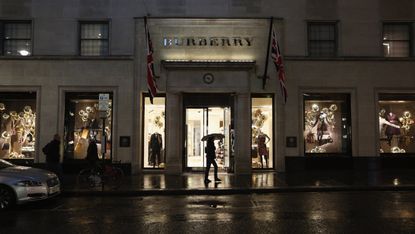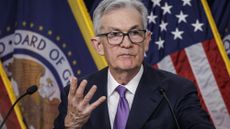Burberry: chequered exit prompts succession crisis
Marco Gobbetti, boss of Britain’s luxury flagship, is leaving to lead Salvatore Ferragamo

Talk about trench warfare. Shares in Burberry sank by nearly 10% on Monday – knocking £1bn off the value of Britain’s luxury flagship – on news that the group’s transformative CEO, Marco Gobbetti, is returning to Italy to lead Salvatore Ferragamo, the Florentine design house known for its leather shoes and silk ties.
The move is “puzzling”, said Lisa Jucca on Reuters Breakingviews. Gobbetti is leaving with his “Burberry turnaround still unfinished”, to join a dynastic brand a third of its size that is also “badly in need of a turnaround”. Perhaps he’s a glutton for punishment; perhaps the Italians are paying more; perhaps he misses home. But the move left the market wondering darkly why Gobbetti is leaving just before his labours were due to start bearing real fruit.

Gobbetti’s ciao to London seems to have “blindsided” Burberry, said Nils Pratley in The Guardian. He was hired in 2017 “to solve one boardroom crisis” (the “uncomfortable reign” of designer-turned-CEO Christopher Bailey) but has now “caused another”. There doesn’t seem to be a succession plan – not ideal when “the UK’s leading fashion house is persistently talked about as a takeover candidate”. Worse, there are fears that chief creative officer Riccardo Tisci – credited with imbuing the company with a more upmarket, youthful and edgy vibe – may follow Gobbetti.
Subscribe to The Week
Escape your echo chamber. Get the facts behind the news, plus analysis from multiple perspectives.

Sign up for The Week's Free Newsletters
From our morning news briefing to a weekly Good News Newsletter, get the best of The Week delivered directly to your inbox.
From our morning news briefing to a weekly Good News Newsletter, get the best of The Week delivered directly to your inbox.
Don’t bet against it, said Anna Murphy in The Times. “The relationship between a chief executive and his designer echoes that between a jockey and his horse”, and Tisci, who previously partnered with Gobbetti at Givenchy, “must be slightly restless in his stable”. Although numbers have improved on their watch (shares are up by more than a third), there has been “no proper Burberry moment”. In this business, that’s bad news.
Sign up for Today's Best Articles in your inbox
A free daily email with the biggest news stories of the day – and the best features from TheWeek.com
Create an account with the same email registered to your subscription to unlock access.
-
 Labour's Brexit conundrum
Labour's Brexit conundrumThe Explainer Keir Starmer backs 'twin track' strategy – build closer security ties with EU while ruling out single market, customs union and free movement
By The Week UK Published
-
 6 scenic white water rafting destinations to get your heart racing
6 scenic white water rafting destinations to get your heart racingThe Week Recommends Have a rip-roaring time on the water
By Catherine Garcia, The Week US Published
-
 Dangerous substances in Lunchables are raising concerns over children's health
Dangerous substances in Lunchables are raising concerns over children's healthIn the Spotlight High levels of lead and sodium were recently found in the snack packages
By Justin Klawans, The Week US Published
-
 Shein: could the year’s mega-IPO fall apart at the seams?
Shein: could the year’s mega-IPO fall apart at the seams?Talking Point Latest hitch is a pre-float 'security review' that could deter potential investors
By The Week UK Published
-
 Labor market strong as inflation sinks
Labor market strong as inflation sinksFeature And more of the week's best financial insight
By The Week US Published
-
 Midair blowout: another black mark for Boeing
Midair blowout: another black mark for BoeingFeature This isn't the first production issue Boeing has encountered
By The Week US Published
-
 Behemoths of the seas
Behemoths of the seasThe Explainer Cruise liners keep getting bigger, with the world’s largest 'megaship' ever built set to make its maiden voyage this month.
By The Week Staff Published
-
 Holiday season: Fed optimism cheers investors
Holiday season: Fed optimism cheers investorsFeature The feds believe their 'pivot' will make a recession unlikely
By The Week US Published
-
 Older workers stay in the labor force
Older workers stay in the labor forceFeature And more of the week's best financial insight
By The Week Staff Published
-
 America's most in-demand job
America's most in-demand jobFeature And more of the week's best financial insight
By The Week US Published
-
 Currency: the long reign of the mighty dollar
Currency: the long reign of the mighty dollarFeature Argentina is planning to drop the peso in favor of the US dollar
By The Week US Published